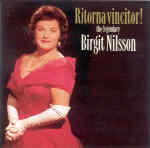This two-CD set is a fine way to appraise the remarkable voice and talents of Birgit Nilsson, the dramatic/Wagnerian soprano the likes of whom we may not see again. With the exception of two major roles–Leonore in Fidelio and Turandot (and her work in Mozart, which was less distinguished)–this selection covers just about all of her triumphs. From her complete recordings of the operas we get the whole final scene from Salome, rock-solid, fearless, and wonderfully corrupt; Elektra’s opening monolog, also solid and more nuanced than she was often given credit for; nine epic minutes of the Immolation Scene; Lady Macbeth’s first-act scena, thrilling in its intensity with high notes blazing, albeit with some smudged coloratura; and “Vissi d’arte”, as sensitively as she ever sang it.
You can convincingly argue that even in the heaviest Italian roles she wasn’t quite right, but here “Ritorna vincitor” (from a 1963 recital) is thrilling and utterly believable–but then along comes an undercharacterized “O don fatale”, with weakish low notes (but blazing high ones) and a “Pace, pace mio Dio” that while studious and intelligent contains not-quite-Italianate pianissimos and a tone quality that just seems wrong. The Wesendonk Lieder are better than I remembered, although they’re slightly lacking in warmth, a “Liebestod” from 1959 under Hans Knappertsbusch is spectacular, and “Dich teure Halle” is exultant.
Songs by Sibelius, Grieg, and Rangström are idiomatic, well-thought out, and gripping, and a snippet from Die Frau ohne Schatten, recorded in 1985 (none of the other selections date from after 1972), shows some aging, but not much–Nilsson remained a phenomenon until the end. And speaking of the end, this collection closes with “I could have danced all night”, with a high-C that can cause brain damage. If you don’t own the complete recordings of Nilsson’s major roles and don’t plan to–and despite the fact that she never was a truly persuasive Italian soprano–make sure you buy this. [6/13/2003]
































